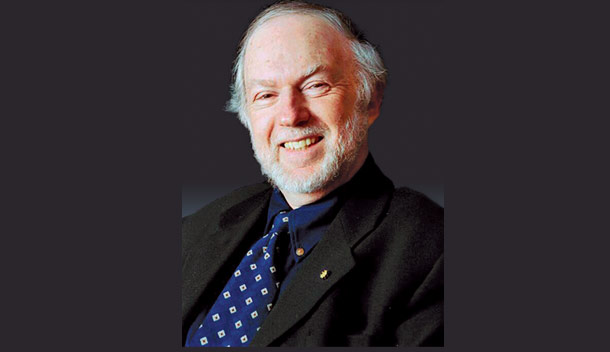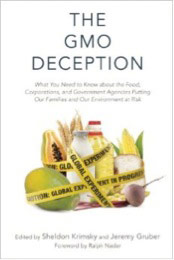Scientist: Claim that GMO safety is settled is nonsense
By Ken Roseboro
Published: October 6, 2014
Category: GMO Health Risks

Sheldon Krimsky, Ph.D.
To access all the articles in this month's issue of The Organic & Non-GMO Report, SUBSCRIBE NOW.
 Biotech proponents’ claims that the debate over the safety of genetically modified foods is settled is wrong, according to Sheldon Krimsky, co-editor of the new book, The GMO Deception: What You Need to Know about the Food, Corporations, and Government Agencies Putting Our Families and Our Environment at Risk.
Biotech proponents’ claims that the debate over the safety of genetically modified foods is settled is wrong, according to Sheldon Krimsky, co-editor of the new book, The GMO Deception: What You Need to Know about the Food, Corporations, and Government Agencies Putting Our Families and Our Environment at Risk.
As its title suggests, the book takes a very critical look at GM foods with articles written by leading scientists, educators, and environmentalists. Articles cover the whole range of the GMO debate from human and environmental health, labeling, and corporate control of agriculture to regulation, sustainability, and ethics.
Krimsky has sounded warnings about the risks of GM foods since the 1980s. He has written or edited 13 books that provide a critical examination of breaking issues in science and technology. He is also chairman of the Council for Responsible Genetics, which fosters public debate about the social, ethical, and environmental implications of genetic technologies.
Krimsky is the Carol Zicklin Visiting Professor of Philosophy at Brooklyn College, the Lenore Stern Professor of Humanities and Social Sciences at Tufts University, and adjunct professor in the Department of Public Health and Community Medicine at the School of Medicine at Tufts University.
What led to the publishing of the GMO Deception?
Sheldon Krimsky: Claims were being made that the health effects of genetically modified foods were resolved. The only issue was public perception.
But when I investigated the scientific literature, I found more than a dozen studies showing negative health impacts, and these have to be addressed. You can’t just throw them away.
When dealing with risks, it’s not about having more studies showing no harm than ones showing harm. One negative outcome is worth 99 positive outcomes because many positive outcomes are funded by industry.
When you want to prove something is safe, you have to set conditions that are most likely to find effects. When developing a new airplane, you don’t just fly at normal conditions; you fly at extreme conditions. In the same way, you have to test GMOs under more extreme conditions in order to have confidence that they are safe.
Unfortunately, every time a scientist shows an adverse effect (from GMOs), that scientist is vilified. We saw this most recently with (Professor Gilles-Eric) Séralini (who published a study showing negative impacts to rats fed GM corn and Roundup herbicide). The things that have been done to him are unprecedented in the history of science. Retracting a paper after a year when the editors initially supported the reviewers and retracting it because “the results are not definitive” is not really valid in the ethics of science. Based on that criterion a great amount of published work would also be retracted.
How did you gather the material for the book? What were your criteria for inclusion in the book?
SK: We tried to piece together good articles from the past with good recent articles.
The articles are written by well-respected scientists and environmental activists. There is a preface by Ralph Nader, and an introduction to the science of genetic engineering by John Fagan.
There are segments in the book that deal with environmental impacts. I published a book in 1996, Agricultural Biotechnology and the Environment, when the biotechnology industry was just starting. We raised the issue of herbicide resistant weeds; that if glyphosate were used ubiquitously, then weeds would become resistant to it. That is what has happened.
Readers of the book can see what scientists are saying and raising questions that aren’t raised in the media.
What are you trying to achieve with the book?
SK: I hope that readers of the book develop their own skepticism when they read articles from mainstream press, such as the Wall Street Journal, that have been persistent in calling skeptics luddites and don’t know what they are talking about.
The agricultural biotech business has tried to construct the science for its commercial interests. There is a lack of recognition of studies that don’t conform to their point of view and a vilification of scientists who produce results they don’t like.
Chapter three is a conversation with Árpád Pusztai (who conducted research showing negative impacts to rats fed GM potatoes), an internationally respected scientist and expert on lectins. He was literally driven out of the United Kingdom and lost his job. The things said about him were unconscionable. That story needs to be told.
What concerns do you have about genetically modified foods?
SK: The fact that we have been eating GM corn and soy for 15 years doesn’t convince me that they are safe. We had lead and PCBs in our environment for 40 to 50 years. You don’t determine something is safe by forcing it in the consumer market and then waiting a number of years to say it’s safe.
It is true that people aren’t keeling over. That’s all we’ve shown with the introduction of GM corn and soy.
But there are many ways that GMOs can affect consumers other than an immediate effect. They can produce chronic effects on the immune system and reduce or increase nutrients in food products. We need to know if we are getting the same nutrients from GM corn as from conventional or organic corn. We need to have transparency.
When scientists face controversy, they go to the literature review. I did this. I looked at articles on GMOs and health effects. I found seven from 2008 to 2014. I found that there was disagreement in the review articles. Reviewers arrived at different conclusions. One review article said that animals fed GM crops died. One or two said there were no problems, and several said there were problems.
To argue that there is no controversy left in this field is nonsense. That is what I found by going deep in the literature. You can’t just write it away.
The tobacco industry used to say that cancer is not caused from smoking; that it must be something else.
Skepticism is a really important part of being scientist. To say there is no controversy left and use a preexisting notion of what is safe and apply that to every product is not the way we do science.
Biotech proponents claim the technology is precise. Do you agree with that claim?
SK: When you put a gene into a plant genome you don’t know where it will go. It could cause gene expression of one part to rise or to diminish.
There are circumstances when you don’t want gene expression to rise. There are toxic effects in a plant that you don’t want to rise, but it could happen with GMOs.
We eat certain plants for their nutrient value. An inserted gene could cause gene expression for a nutrient to go down.
It’s a lot more complex than saying I fed it to the mouse and it survived. It’s a very simplistic view of what’s safe and not safe.
© Copyright The Organic & Non-GMO Report, October 2014




